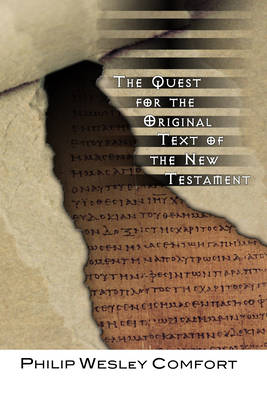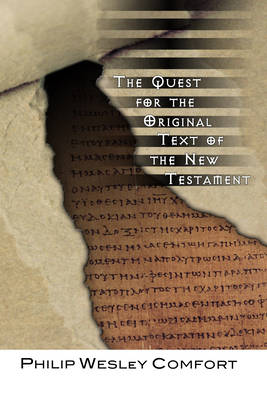
- Afhalen na 1 uur in een winkel met voorraad
- Gratis thuislevering in België vanaf € 30
- Ruim aanbod met 7 miljoen producten
- Afhalen na 1 uur in een winkel met voorraad
- Gratis thuislevering in België vanaf € 30
- Ruim aanbod met 7 miljoen producten
Zoeken
€ 42,95
+ 85 punten
Omschrijving
If only we could hold the actual words of Luke's descriptive narrative or Paul's outpouring of pastoral pain to the church at Corinth. Now we can. A continuing quest to recover the New Testament text allows Christians to open their Bibles with confidence that the words approximate the writers' Greek quill strokes or the English equivalents. Such thought breaths excitement into Philip Comfort's history of the New Testament text and discussion of the credibility (and limitations) of texts and translations. Comfort challenges the view that early copyists were careless and took editorial liberties. He argues that their accuracy and integrity are indisputable. While this task involves comparing manuscripts, technical facts are framed in historical and cultural color. He assures Christians that even uncovering the paper signed by Paul would not change our understanding of what he said. This introduction to the work of textual criticism challenges students to continue the quest for the original text. It is essentially a sequel to 'Early Manuscripts and Modern Translations of the New Testament.'
Specificaties
Betrokkenen
- Auteur(s):
- Uitgeverij:
Inhoud
- Aantal bladzijden:
- 200
- Taal:
- Engels
Eigenschappen
- Productcode (EAN):
- 9781592443208
- Verschijningsdatum:
- 2/09/2003
- Uitvoering:
- Paperback
- Formaat:
- Trade paperback (VS)
- Afmetingen:
- 145 mm x 219 mm
- Gewicht:
- 267 g

Alleen bij Standaard Boekhandel
+ 85 punten op je klantenkaart van Standaard Boekhandel
Beoordelingen
We publiceren alleen reviews die voldoen aan de voorwaarden voor reviews. Bekijk onze voorwaarden voor reviews.











